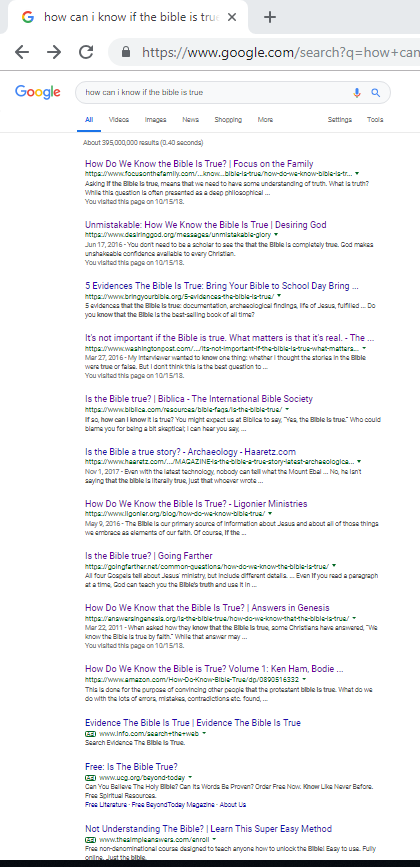I Googled “How Can I Know the Bible Is True” And the Results Were Disappointing
I recently conducted an little experiment. As members of The Church of Jesus Christ of Latter-day Saints, we’re often challenged by other Christians with the question: How do you know The Book of Mormon is true? In my head I sometimes turn the question around: How do you know the Bible is true? Of course, Latter-day Saints believe the Bible is true, but curious about what the average Christian answer might be, I Googled the question. The results (the literal results) were surprising, to say the least. Here are screenshots of the first two pages of results (the purple links are ones I clicked on):
The Google results
What was surprising
There’s obviously no shortage of websites willing to give their two cents on the issue. Most of them attempt to show the Bible is true because of the following:
- The Bible is true because there’s lots of archaeological evidence in favor of its historicity.
- The Bible is true because such an ancient text wouldn’t have survived this long otherwise.
- Before the Bible as we know it existed, each book of the Bible stood alone. Now, the fact that these books do not contradict each other is further evidence of its truthfulness.
- The Bible is true because it has changed so many lives.
- The Bible is true because the Bible says so.
- The Bible is true because things that were prophesied in it have actually happened.
- The Bible is true because when you live by its teachings, good things happen.
- The Bible is true because when you read it, you can just tell.
As you can see, some answers were better than others. Some of these honestly are great points and well worth looking into. Archaeological evidence about Bible events is fascinating, and it’s definitely miraculous to see the prophecies unfold. But as I browsed I became exceedingly cognizant of one explanation that simply was not appearing. I finally found it very briefly mentioned at the end of the last article on the second page of search results. And even then, it was only mentioned after talking about some of the bullet points above, almost like a last resort.
The answer I was looking for
Ask God! That was the answer I was looking for. That was the answer I thought would pop up immediately. After all, as Christians (not just Latter-day Saints), we believe God answers prayers, right? Isn’t it the Bible itself that promises,
If any of you lack wisdom, let him ask of God, that giveth to all men liberally, and upbraideth not; and it shall be given him.
Is asking God really all that foreign of an idea? If the Bible is true, and God is real, then we know that He cannot lie. He is the ultimate source of all truth. When we want to know if something (especially something as important as the Bible) is true, why is praying about it not at the top of our to-do list?
The problem with asking
The same principle is true for The Book of Mormon. If people want to know it’s true, they need to ask God. We’re promised that God will send the Holy Ghost to answer that prayer.
This is when things get more difficult, and where many Christians (including Latter-day Saints) might sort of chuckle and say, “yeah, suuure, I’ll ask God,” while internally responding as Laman and Lemuel did to Nephi’s question:
And I said unto them: Have ye inquired of the Lord?
And they said unto me: We have not; for the Lord maketh no such thing known unto us.
That idea was just as wrong then is it is now. God answers prayers. How or when God will answer your prayer is up in the air. An answer could come through a revelatory dream or vision this very night or during your personal scripture study two months from now, or through a sudden flood of intelligence.
It will happen however and wherever God wants it to happen. One thing, though, is certain: The Holy Ghost will be involved in your answer. That’s problematic for a lot of people because the scriptures teach us that the Holy Ghost often (but not always) manifests itself through intangible means or emotions, as described in Romans:
But the fruit of the Spirit is love, joy, peace, longsuffering, gentleness, goodness, faith, meekness, temperance …
Many skeptics reasonably claim, “Your personal feelings are not a reliable source of truth.” And that’s a fair point, they aren’t. Heck, pizza makes me feel joy and peace. But that’s probably not a witness from the Holy Ghost about … pizza. And yet, at the same time, the Spirit is undeniably involved with emotion. So, what do we do with that?
Well, we’ve got to figure out how to tell the difference between our own emotions and the emotions prompted or utilized by the Holy Ghost. That’s a task each of us has to undertake if we hope to learn the language of the spirit. There’s no other way around it. It takes practice, attention, experience, and even trial and error. I’m going to leave it at that, though there’s a lot more to be said on this topic. It’s an article for another day.
Prayer shouldn’t exist in a vacuum
Asking God implies much more than just kneeling and praying. Those who believe otherwise would do well to learn from the Lord’s rebuke to Oliver Cowdery in 1829:
Behold, you have not understood; you have supposed that I would give it unto you, when you took no thought save it was to ask me.
But, behold, I say unto you, that you must study it out in your mind; then you must ask me if it be right, and if it is right I will cause that your bosom shall burn within you; therefore, you shall feel that it is right.
If you’re praying about the Bible (or The Book of Mormon), you’ve got to be studying it, too. You’ve got to put some effort into figuring it out for yourself. God isn’t just a Zoltar machine.
And asking God directly doesn’t diminish the value of physical evidence. Soak that stuff up. The problem is that, inevitably, you’re going to hit a wall. Archaeologically empirical evidence may never prove that God spoke to Moses through a burning bush, or that Balaam briefly had a talking donkey, or that God even exists. Answers to some questions can only come from the Spirit of God.
Put it to the test
So, is the Holy Bible truly God’s inspired word? Surely Moroni’s promise applies to more than just The Book of Mormon:
And when ye shall receive these things, I would exhort you that ye would ask God, the Eternal Father, in the name of Christ, if these things are not true; and if ye shall ask with a sincere heart, with real intent, having faith in Christ, he will manifest the truth of it unto you, by the power of the Holy Ghost.
And by the power of the Holy Ghost ye may know the truth of all things.
Asking God to confirm or reveal spiritual truth is a divinely instituted process. It’s this process that prompted Christ himself to commend the apostle Peter after his declaration that Jesus was in fact “the Christ, the Son of the living God”:
Blessed art thou, Simon Bar-jona: for flesh and blood hath not revealed it unto thee, but my Father which is in heaven.
So if you’re struggling for truth, follow the example of James, of Moroni, of Peter, and ask God.








